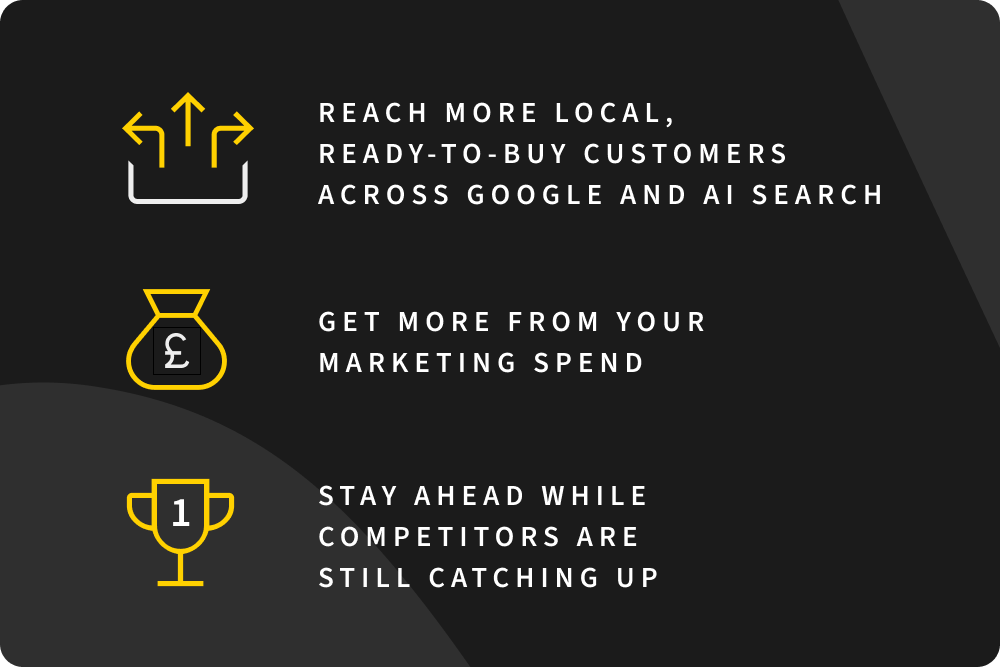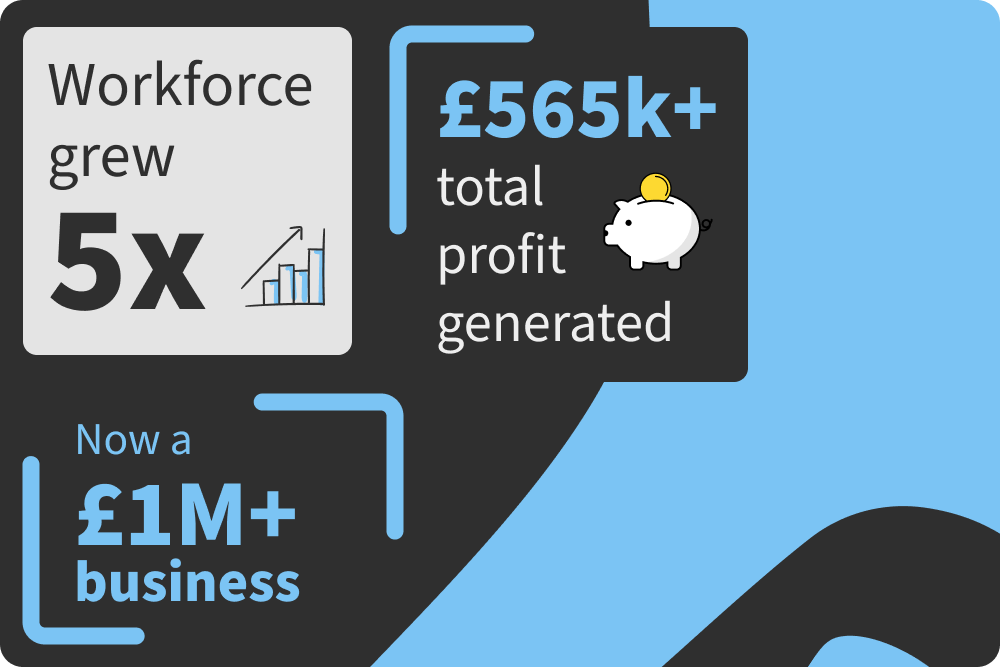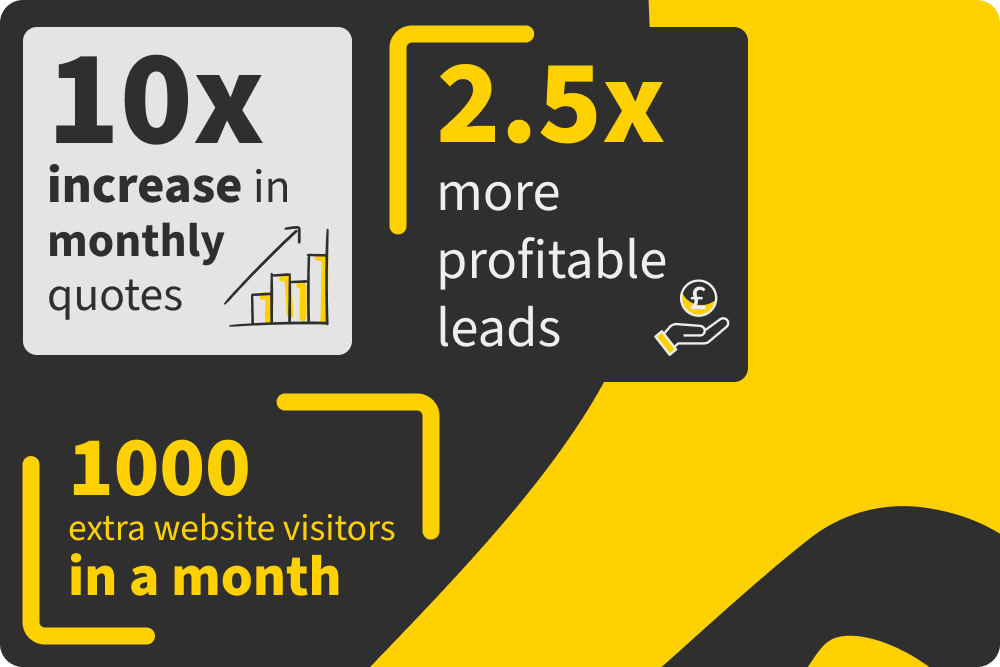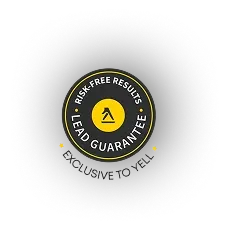Digital Marketing for Small Business
Our digital marketing services can help your small business flourish in the online space, from a new website to Paid Search, Video, Social Marketing, and SEO.
Paying for marketing that doesn’t work? That’s a real risk. Watch our video to find out more about our lead guarantee so you can grow your business with confidence.
request a call back in two steps!
Guaranteed Leads. Exclusive to Yell. Let’s grow your business, together.
By submitting this form, you will be sharing your contact details with Yell Limited. We will call you in accordance with our privacy policy.

BOOST YOUR REACH & REPUTATION
Small and Medium Enterprise (SME) businesses make up an incredible percentage of the UK’s business population
And while walk-ins and word of mouth are both still effective drivers of leads and sales for those businesses, there’s no denying the importance of maintaining a professional online presence.
Whatever your small business, it’s likely that, whether locally, nationally, or internationally, people will be searching for it online.
BOOST YOUR REACH & REPUTATION
Here at Yell, we offer a range of expert digital marketing services to boost your online presence and help your small business find and attract relevant, carefully targeted customers
Your up-to-date business information will appear everywhere customers are searching for services like yours, including Yell, Google, Waze, Facebook, Instagram, Apple Maps, Amazon Alexa, Microsoft and more. You can also easily collect and respond to customer feedback across major online platforms.
We’ll work closely with you to make sure your website gets to the right people in the places they go online, from search engines to social networks and editorial sites.

Frequently Asked Questions
What are SEO keywords?
In the context of search engine optimisation (SEO), keywords are specific words or phrases that are used to help search engines understand the content of a webpage. By including relevant keywords in the text, tags, and other elements of a webpage, businesses can increase the chances of their website ranking higher in search engine results for those specific keywords. Using the right keywords can also help to attract the right audience to a website and increase the chances of generating leads and sales. In short, keywords are an important aspect of SEO as they help search engines understand the content of a webpage and attract the right audience to a website.
How does digital marketing help small businesses?
Digital marketing is a valuable tool for small businesses as it allows them to reach their target audience and promote their products or services through a variety of online platforms. Digital marketing strategies such as search engine optimisation (SEO), social media marketing, and pay-per-click (PPC) advertising can help small businesses increase their online presence, drive traffic to their website, and generate leads and sales. Additionally, digital marketing offers detailed analytics and insights, allowing small businesses to track the effectiveness of their marketing efforts and make data-driven decisions. Overall, digital marketing is a cost-effective and efficient way for small businesses to reach their target audience and promote their products or services online.
What does “PPC” mean and why is it good for small businesses?
Pay-per-click (PPC) is a digital advertising model in which advertisers pay a fee each time one of their ads is clicked. PPC allows businesses to bid on specific keywords or phrases that are relevant to their products or services, to have their ads appear in the search engine results when those keywords are searched for. PPC is a popular advertising option for small businesses as it allows them to reach their target audience through targeted ads and only pay when their ad is clicked. PPC can be an effective way for small businesses to drive traffic to their website, generate leads, and increase sales.
What does “impression” mean in digital marketing?
In digital marketing, an impression refers to a single instance of a business’ advertisement being displayed on a webpage or app. Impressions are often used as a metric to measure the reach and visibility of an ad campaign. For example, if an ad is displayed 1000 times, it would be said to have received 1000 impressions. Impressions are important in digital marketing as they can help businesses understand the reach and effectiveness of their ad campaigns. While impressions do not necessarily indicate that an ad has been seen or engaged with, they can provide valuable insights into the reach and visibility of an ad.
Are “digital marketing” and “social media marketing” the same thing?
Digital marketing and social media marketing are not the same, although they are closely related. Digital marketing refers to the use of digital channels and technologies to promote products or services online. This includes a wide range of tactics and strategies such as search engine optimisation (SEO), email marketing, pay-per-click (PPC) advertising, and more. Social media marketing, on the other hand, refers specifically to the use of social media platforms like Facebook, Instagram, Twitter, and LinkedIn to promote products or services. While social media marketing is a subset of digital marketing, it is a distinct strategy that focuses on utilising social media to reach and engage with a target audience.
DIGITAL MARKETING SOLUTIONS for
Small Business
Websites for Small Business
Your website is likely to be one of the first impressions your business will make to potential customers, and the ideal way to showcase your skills, goods, and services.
Making sure that this works effectively and appeals to your target audience is a key starting point for any small business, whether your services are digital or offline. With Yell’s website creation packages, we’ll work with you to build an online space that showcases all the information visitors may want or need when considering your business. From product pages to contact us forms, we’ll make sure your services are both appealing and, most importantly, sellable online. If you think you’d like support in the future, we can also be available to help with website updates, tweaks, or additions as you need them.
Pay-Per-Click (PPC) for Small Business
Paid search can be a powerful tool for any small businesses looking to increase their online presence and reach their target audience. Yell’s paid search services have helped small businesses of all types to effectively reach and engage with their audience through targeted ads on the key search engines of Google and Bing.
Our PPC packages mean we can use your advertising budget in a way that best benefits your business, and target specific demographics, interests, and locations for relevant search queries. This allows for a more focused and efficient ad campaign, as we’ll be able to tailor your ads to reach your desired audience directly. Additionally, our paid search services offer detailed analytics and insights, so we can track the effectiveness of your campaigns and make data-driven decisions on future advertising efforts. And it’s not just about driving brand new visitors to your site – paid search campaigns can even retarget interested customers who visited your site in the past with a reminder of your products and services.
Social Media for Small Business
While Google is the most used website on the planet, Facebook is the most searched-for word in the world, which gives an idea of the popularity of this social network alone. Each social media platform serves a different purpose to every user, but across all of them, people are searching for businesses, recommendations, reviews, and products, both locally and nationally.
Our social media marketing packages will help you to showcase your products, skills, expertise, or venue across platforms like Facebook, Instagram, LinkedIn, and YouTube, using creative campaigns and smart advertising, which we can target to your ideal audience. Not only will this boost your visibility and credibility amongst viewers, but is also an excellent approach for increasing traffic, leads, and bookings.
Online Reputation Management for Small Business
A strong online reputation can help small businesses gain visibility, trust, and credibility and can help to attract customers. You can gain an advantage over your competitors by highlighting a positive track record of high-quality products or services and customer satisfaction.
Our Reputation Management solution will help you to easily request, manage, and respond to online reviews by consolidating them into one, simple dashboard. You can also connect your social profiles to a centralised social portal, so you can easily communicate and engage with your customers. We’ll also make sure that your small business is discoverable, by distributing your relevant information and contact details across the internet, helping you to be found on relevant sites and directories.
Search Engine Optimisation (SEO) for Small Business
Google’s search engine is the most visited website in the world, responding to billions of queries every day. Our SEO packages are designed to help your small business feature in high positions on Google’s results pages so that potential customers who are or could be interested in your products or services can find you easily.
Our experts will produce a detailed website performance report and Google Search Console audit to identify key areas for improvement, research relevant keywords for your business, and create content strategy and internal link benchmarking reports. All these work together to help ensure your website can be found by more potential customers using relevant search keywords and ranked more highly in Google search results. With better visibility in Google, you can expect to see higher website traffic, more phone calls, emails/contact form submissions, and an increased chance of bookings and sales. Not only will we ensure your products and services are featured, but we’ll also factor in any location specifics to ensure you’re visible to searchers in the right geographic region. There’s no one-size-fits-all approach to SEO, but with our packages, you’ll be able to stand out from your competitors and drive visibility to credible, qualified customers.
solutions Starting at £249 per month



